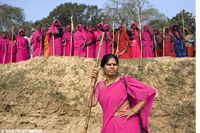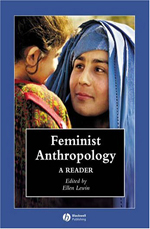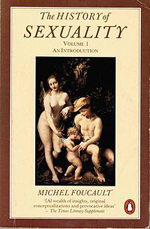
Early twentieth century anthropologists presumed that the social and political differences or divisions between men and women were 'natural'. The pioneering anthropologist Phyllis Kaberry, who did fieldwork among Australian Aborigines in the 1930s, depicted women as 'active agents'. Although her material reveals women not to be subservient, nonetheless they are generally subordinate relative to men. Margaret Mead, who also commenced fieldwork in the 1930s, while not concerned with subordination, demonstrated that ideals of femininity and masculinity vary enormously between groups. Her ideas continue to be relevant.
Thanks to the Womens' Liberation Movement of the 1970s, a younger generation of women began to question the masculinist orthodoxies in social anthropology, both in the traditions in fieldwork and the literature. An important distinction which began to be made was that between sex as a biological given and gender as culturally variable. In this way, it was argued that divisions of labour and different roles assigned on the basis of gender were no longer accepted as biologically inevitable. Whilst sex at birth is relatively fixed, the meanings and behaviour associated with physical, sexual differences were seen as fluid and varied across cultures. In the 1990s, the dichotomy is held to be less clear, but even in the 1970s it was always recognised that human biology could also be culturally transformed and manipulated.
From the mid-1970s, a number of important volumes by women anthropologists made women more visible and also raised key questions about gender and anthropological theory. Contrary to subsequent caricatures in later literature, this strategy never implied that women should be studied separate from men and gender. Neither was it suggested that women could be studied separate from men, nor did the material suggest that women were universally the same. The vast cross-cultural range of the early volumes already displayed differences among women. Although masculinity is only recently being studied in detail, gender studies aim to explore the full ranges of gender categories, including androgyny, in different cultural contexts.
The impact of gender studies is also apparent in relation to field work. Early texts by women such as Elenore Smith Bowen and Hortense Powdermaker demonstrated the importance of personal experience, individual identity and social relationships in writing anthropology. Once marginalised, these texts explored the ideas which are now central to the discipline.
Text written by: Professor Judith Okely (reproduced with author’s permission)
Postgraduate programmes in the UK
** There are currently no postgraduate degree programmes in Anthropology of Gender, however, many universities in Britain offer postgraduate degrees in Gender Studies or Gender and Development**
Recommended Resources
Films
 Q2P
Q2P
Director: Paromita Vohra
Release: 2006
Length: 55 mins
Location: India, Mumbai / Asia
Q2P is a film about toilets and the city. It sifts through the dream of Mumbai as a future Shanghai and searches for public toilets, watching who has to queue to pee. As the film observes who has access to toilets and who doesn’t, we begin to also see the imagination of gender that underlies the city’s shape, the constantly shifting boundaries between public and private space; we learn of small acts of survival that people in the city’s bottom half cobble together and quixotic ideas of social change that thrive with mixed results; we hear the silence that surrounds toilets and sense how similar it is to the silence that surrounds inequality. The toilet becomes a riddle with many answers and some of those answers are questions – about gender, about class, about caste and most of all about space, urban development and the twisted myth of the global metropolis.
 Pink Saris
Pink Saris
Director Kim Longinotto
Release 2010
Length 100 mins
Format Colour / DVD / PAL / All region
Location India
Language Hindi (English Sub)
Pink saris are worn by the Gulabi Gang, a group of women vigilantes in Northern India. From the untouchable caste, they resist being condescended to as the lowest social class. They have a champion in the form of the formidable Sampat Pal, who takes up their cases of social injustice and domestic abuse - often perpetrated by their husbands' extended families, with whom they're forced to live.
The Royal Anthropological Institute (RAI) has one of the largest ethnographic film libraries in Europe. Films are available for hire, sale or loan, for educational and academic purposes. Clike here for a list of films the RAI distributes on Anthropology of Gender.
General
http://www.artnet.com.br/~marko/firste.html - a website project on Anthropology, Gender and Masculinity established in Brazil.
http://anthropology.usf.edu/women/ - a website which celebrates women anthropologists.
Books



Feminist Anthropology: A Reader
Lewin, Ellen (ed.) (Wiley Blackwell, 2005)
The History of Sexuality: An Introduction, Volume 1
Foucault, M. (Penguin Publishers, 1984)
Sexualities in Anthropology: A Reader
Andrew P. Lyons (Editor), Harriet D. Lyons (Editor) (Wiley-Blackwell, 2011)
Professional Organisations, Groups & Associations
Association for Feminist Anthropology- a branch of the American Anthropological Association which raises awareness of feminist issues and supports women in Anthropology.
International Gender Studies Centre – A multidisciplinary research unit linked to the University of Oxford’s Department of International Development promoting research on gender, culture and development.
Association for Queer Anthropology- AQA is a branch of the American Anthropological Association which encourages research, the development of teaching materials, promoting communication, and serving the interests of gay and lesbian anthropologists.
Disclaimer: The above information is provided for information and guidance only. It should not be interpreted as endorsement or otherwise by the Royal Anthropological Institute (RAI) for any external institution listed. Furthermore, the RAI accepts no responsibility for material created by external parties or the content of external websites.

